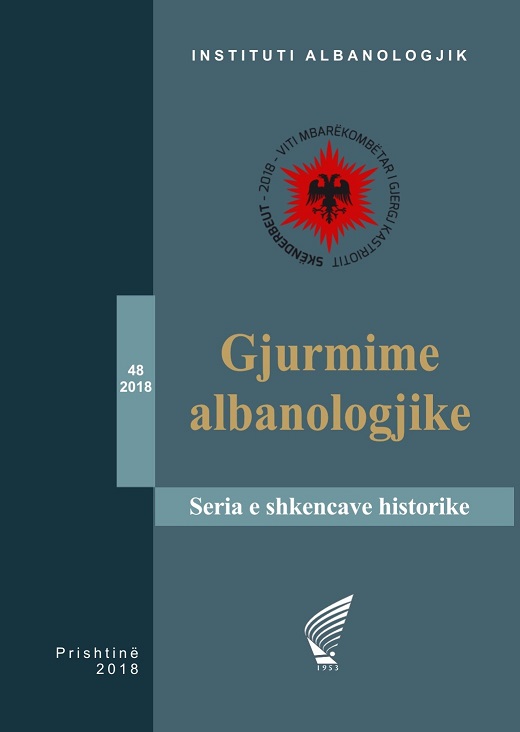BESIMI FETAR ORTODOKS DHE VOJVODËT (ROJTARËT) E KISHAVE DHE MANASTIREVE NË VILAJETIN E KOSOVËS (SHEKULLI XIX – 1912)
THE ORTHODOX RELIGIOUS FAITH AND VOYVODES (GUARDIANS OR PROTECTORS) OF CHURCHES MONASTERIES IN THE VILAYET OF KOSOVO (19th CENTURY – 1912)
Author(s): Izet MiftariSubject(s): History of Church(es), Social history, 19th Century, The Ottoman Empire, Eastern Orthodoxy, Sociology of Religion
Published by: Instituti Albanologjik i Prishtinës
Keywords: Kosovo; 19th century; Orthodoxy; voyvodes; guardians of churches monasteries; Ottoman Empire; Orthodox community in Kosovo;
Summary/Abstract: The position of the Orthodox in the Ottoman Empire was not serious, as it tries to portray for Serbian historiography purposefully. Indeed, based on published and unpublished historical data, we see that the Orthodox community, in this case the Serb, in Vilayet of Kosovo was privileged and protected by the Ottoman authorities. It should also be noted that the Orthodox Christians in the Ottoman Empire, and so in Kosovo, were indoctrinated by Russian invasion policy, which through them aimed to penetrate the Mediterranean Sea An important fact that proves that the Serbian Orthodox community in Kosovo was cooperative with Ottoman authorities was the case of some Serbian teachers and students who had performed the Ottoman anthem during Sultan Mehmed Reshat's visit to Kosovo in June 1911. Since in 1766, by the decision of Sultan Mustafa III (1757 - 1774), Patriarchy of Peja (Pec) was suppressed, during the XIX century, more or less the Orthodox Serbs in Vilayet of Kosovo belonged to the diocese Raska-Prizren. During the nineteenth and early twentieth centuries, one of the most interesting phenomena in Kosovo was the care of Orthodox churches and monasteries by Muslim Albanians. This phenomenon is to be distinguished because, here we are dealing with something that does not happen in other peoples. Thus, eg. the Deçan Monastery was guarded by the family of Sali Rrusta, Patriarch of Peja (Pec), the house of Zhuj Veseli from Rugova, and the Deviç monastery Behram Vojvoda, a family from Llausha, a village in the municipality of Skenderaj. The Albanian guards or, as they were known to the people, voyvodes of Orthodox churches and monasteries, fanatically guarded these objects of Orthodox faith, for they were probably Orthodox Albanians before they passed on to the Islamic faith. There were times when defending Orthodox religious objects, several Albanian voyvodes were killed.
Journal: Gjurmime Albanologjike - Seria e shkencave historike
- Issue Year: 2018
- Issue No: 48
- Page Range: 133-147
- Page Count: 15
- Language: Albanian
- Content File-PDF

